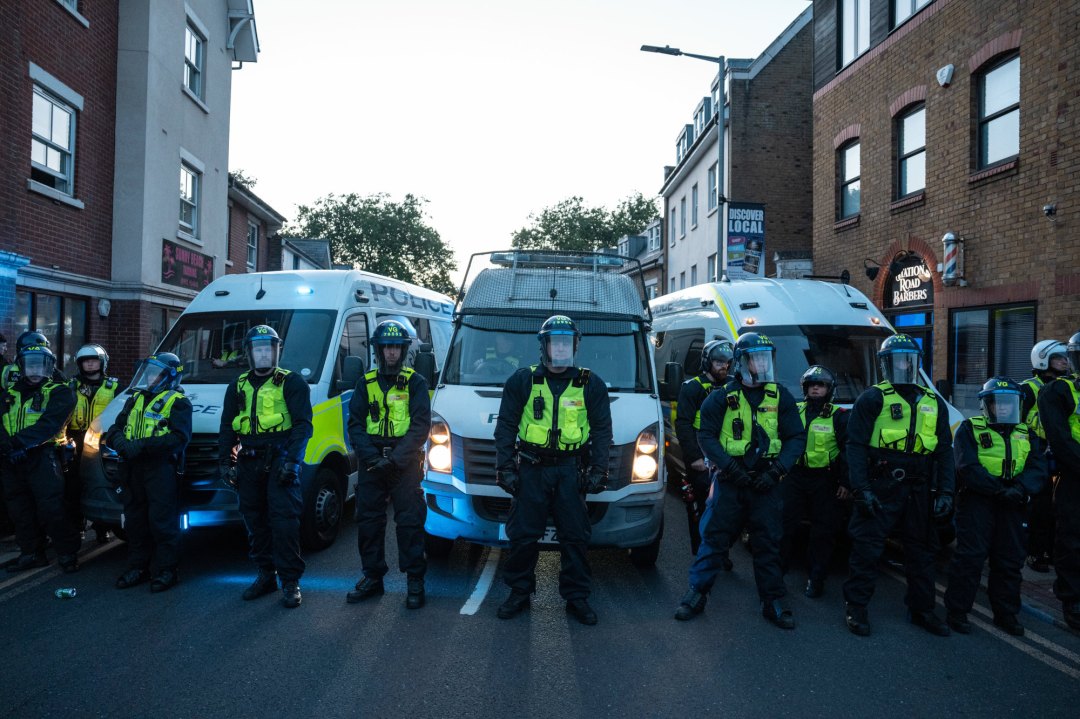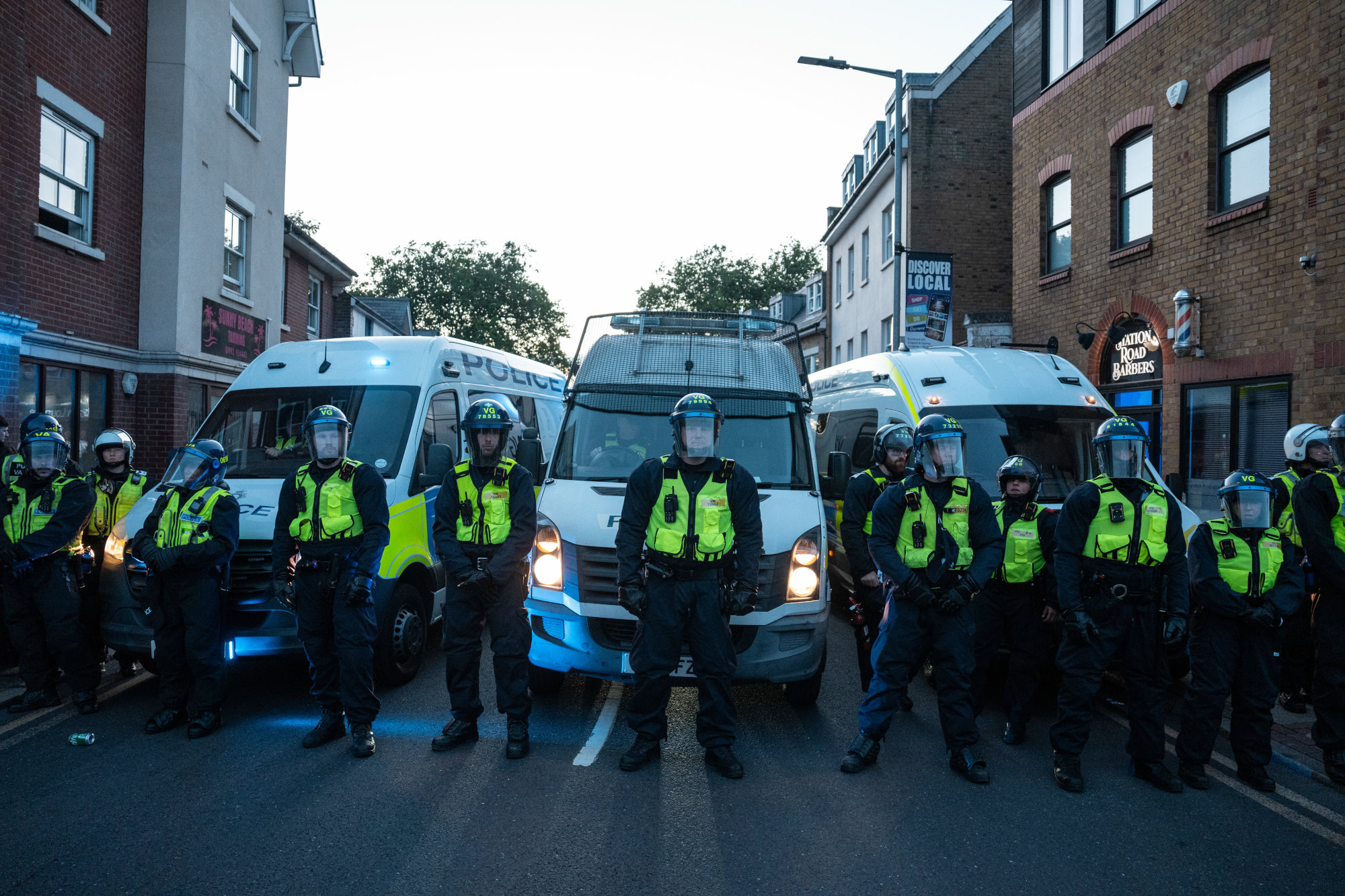Migrant hotel protests are erupting across the country, as ‘tinderbox’ Britain catches fire. What began with a series of protests in Epping, Essex, over the alleged sexual assault of a teenage girl by a recently arrived Ethiopian migrant, has now spread, as Brits air long-standing grievances about asylum seekers they have been forced to host in their own communities.
A powerful tendency now exists in the British state towards displacement activity
Demonstrations have so far been reported in Bournemouth, Southampton and Portsmouth, Norwich, Leeds and Wolverhampton, Sutton-in-Ashfield in Nottinghamshire, Altrincham and even at Canary Wharf in London. With years of unaddressed anger rapidly making itself felt, the police, pulled in all directions, are struggling to keep up. ‘Local commanders are once again being forced to choose between keeping the peace at home or plugging national gaps’, admits the head of the Police Federation.
Still, it seems there is one thing the government is more than happy to devote resources to: trawling the internet for anti-migrant sentiment. The Telegraph reports that an elite team of police officers convened by the Home Office is set to monitor social media to flag up early signs of unrest. Working out of the National Police Coordination Centre (NPoCC) in Westminster the new National Internet Intelligence Investigations team will ‘maximise social media intelligence’ gathering in order to ‘help local forces manage public safety threats and risks’.
If this new division was just about intelligence-gathering that would be one thing. It’s true that social media is in invaluable resource for following events on the ground at such gatherings, while local Facebook groups are often where grassroots protests are organised.
Yet we know that when it comes to the British state and social media, censorship and punishment for online speech is never far behind. Ever since Sir Keir Starmer repeatedly linked the Southport unrest last year with social media, the idea has firmly taken root in Whitehall that the best way to stop unrest is to aggressively police the internet. Ofcom, the broadcast regulator, already takes this view, and the link has even been drawn in Department for Education guidance on how to talk to schoolchildren about the Southport disorder. In a recent report, the police inspectorate said that forces must be ‘better prepared and resourced to monitor, analyse, use and respond to online content’, which it argues was a risk to public safety. This general zeal for social-media policing is why Big Brother Watch believes the new unit is very likely to infringe on free speech. The investigations team is ‘Orwellian’ and ‘disturbing’, says interim director Rebecca Vincent, creating the possibility that it ‘will attempt to interfere with online content’ as other government bodies are known to have done during Covid.
As if there weren’t enough threats to free speech already. This week age verification provisions in the latest stage of the Online Safety Act (OSA) kicked in, meaning that some footage of protests is now inaccessible on social media for many users. Not even parliamentary privilege is safe from the censorship regime. Katie Lam’s searing April speech on the rape gangs, in which she quoted court transcripts and survivors, could not be watched on X without age verification.
We are beginning to look like North Korea with rainbow flags: for the public’s ‘safety’, footage exposing grievous failures of the British state now cannot be viewed in the UK. Little wonder, given the OSA explicitly earmarks content relating to ‘child sexual abuse’ and ‘illegal immigration and people smuggling’ as the ‘kinds of illegal content and activity that platforms need to protect users from’. The Conservatives, who bequeathed us this blank cheque for digital authoritarianism, certainly need to take a long, hard look at themselves. The claims that the OSA is merely about restricting access to pornography have been exposed as a mere fig leaf.
And still things could still get worse. As the Free Speech Union has noted, shortly after last year’s riots, the Centre for Countering Digital Hate (CCDH), a pro-censorship lobby group with ties to Morgan McSweeney, ‘hosted a closed-door meeting under the Chatham House rule to discuss the role of social media in civil unrest’. In attendance were officials from the Home Office, the Department of Science, Information and Technology, Ofcom and other organisations. The CCDH proposals that emerged included amending the OSA to ‘grant Ofcom additional “emergency response” powers to fight “misinformation” that poses a “threat” to “national security” and “the health or safety of the public”’. This would give Secretary of State Peter Kyle the ability to directly flag unapproved content to be taken down at a time of ‘crisis’. Should the unrest continue this could well be coming down the track.
What all this illustrates is just how ill-equipped the people in charge are to deal with Britain’s problems, as The Spectator’s Madeline Grant noted earlier this week. A powerful tendency now exists in the British state towards displacement activity. Spin doctors ‘manage’ the news. Police surveil social media. The government shuffles asylum seekers from hotel to hotel, or to HMOs, or even to privately rented accommodation (which it uses your own taxes to outbid you for). For his part, the prime minister has been tweeting about the women’s football. As the unrest grows, leading politicians continue doggedly insist that Britain remains a ‘a successful multi-ethnic, multi-faith country’.
In reality, there are answers to the asylum hotels crisis, it’s just that the government simply lacks the will to act. Large numbers of illegal migrants need to be deported, while those that are here should be placed in a secure holding facility somewhere remote.
What is surely obvious by now is where they should not be: in hotels, in an Essex market town 500 yards from a school; on the Bournemouth beachfront; in London’s financial district; in a Leeds suburb right next to a shopping centre. As it is, however, it seems the regime will try anything and everything before addressing people’s real concerns.








Comments